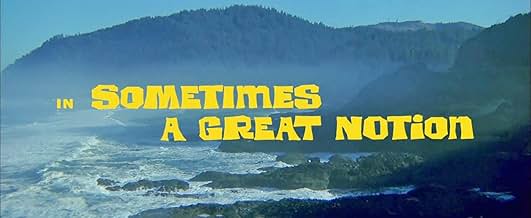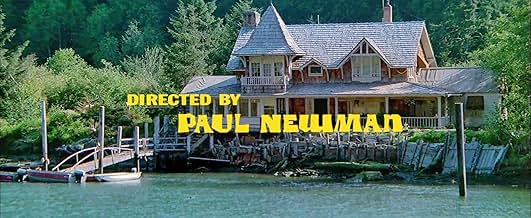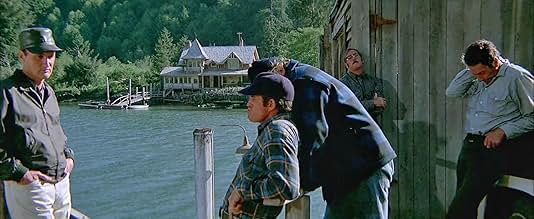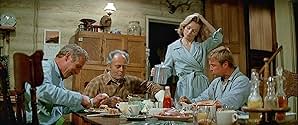NOTE IMDb
6,9/10
4,8 k
MA NOTE
Une famille de bûcherons de l'Oregon farouchement indépendants se bat pour maintenir à flots l'activité familiale en des temps de changement.Une famille de bûcherons de l'Oregon farouchement indépendants se bat pour maintenir à flots l'activité familiale en des temps de changement.Une famille de bûcherons de l'Oregon farouchement indépendants se bat pour maintenir à flots l'activité familiale en des temps de changement.
- Nommé pour 2 Oscars
- 2 nominations au total
Avis à la une
Sometimes a Great Notion (1970)
This is an amazing story, with some harrowing scenes and really terrific acting. And it's based on a Ken Kesey novel that is one of my favorite books, a sprawling, difficult, layered up masterpiece of some kind, for its time at least, and for when I read it as a 20 year old looking for meaning in life. There are so many threads in the book, powerful themes and small ones, that get interwoven into a vivid, unashamed adventure-romance with interior explosions and characters clashing with nature and cultures clashing of cultures, it's really impossible to make a movie out of it.
But Paul Newman, as lead character and, yes director (stepping in when the original director left), has tried. The result is grossly unappreciated, because the strengths here make the flaws bearable. The flaws are clear. The casting is uneven. Lee Remick is a character from another movie plopped into this rough and tumble Oregon backwoods scene, and the second leading man, a kind of implied narrator to it all, is played by little known Michael Serrazin, a pretty boy who holds his own but is uninspiring.
Furthermore, the filming is straight on and meant to show what is happening more than contribute to the ambiance of the experience. There are scenes of machinery and logging that are impressive in their raw scale and masculinity, for sure, but that is partly fast editing at work, and amazing subject material. The rainy coastal landscape, the rambling house on the river, even the dirt bike race and the scenes of the little town all make you yearn for more intensity and involvement, visually.
The music by Henry Mancini shows the strain of this amazing composer as he moves from the light orchestral work he did in the 1960s ("Moon River," "Pink Panther," "Days of Wine and Roses," etc.) to something embracing country, rock and roll, and contemporary music being used so effectively in New Hollywood films. It's halfway there, but gives a falseness to some of the scenes that gets in the way of the gritty, emotional drama to it all.
And I mean emotional. Some have criticized Kesey's novel for overachieving. It tries to deal with every big issue there is in one book: individualism and love, above all, but a highly dysfunctional family, the new America of college and drugs vs. the old one of hard work and croneyism, raw beauty in the landscape vs. exploiting nature for commercial gain, and loyalty to family in all its layers of father and sons, sons and lovers, and workers as part of extended family. But that's what makes the book and the movie terrific. The scenes here of Newman doing anything, of Henry Fonda playing the tough as nails dad, and of some of the side actors in their rough daily working roles in the woods are right on. The hospital scene with Newman and Fonda is a small gem, and the famous scene of Newman trying to free his little brother (played by Richard Jaeckel) caught under a log under water is utterly unforgettable. Utterly.
There is a lot of filler her, lots of falling trees and bikers racing and a building of the toughness of this manly world. But hang in there for the other stuff. And read the book.
This is an amazing story, with some harrowing scenes and really terrific acting. And it's based on a Ken Kesey novel that is one of my favorite books, a sprawling, difficult, layered up masterpiece of some kind, for its time at least, and for when I read it as a 20 year old looking for meaning in life. There are so many threads in the book, powerful themes and small ones, that get interwoven into a vivid, unashamed adventure-romance with interior explosions and characters clashing with nature and cultures clashing of cultures, it's really impossible to make a movie out of it.
But Paul Newman, as lead character and, yes director (stepping in when the original director left), has tried. The result is grossly unappreciated, because the strengths here make the flaws bearable. The flaws are clear. The casting is uneven. Lee Remick is a character from another movie plopped into this rough and tumble Oregon backwoods scene, and the second leading man, a kind of implied narrator to it all, is played by little known Michael Serrazin, a pretty boy who holds his own but is uninspiring.
Furthermore, the filming is straight on and meant to show what is happening more than contribute to the ambiance of the experience. There are scenes of machinery and logging that are impressive in their raw scale and masculinity, for sure, but that is partly fast editing at work, and amazing subject material. The rainy coastal landscape, the rambling house on the river, even the dirt bike race and the scenes of the little town all make you yearn for more intensity and involvement, visually.
The music by Henry Mancini shows the strain of this amazing composer as he moves from the light orchestral work he did in the 1960s ("Moon River," "Pink Panther," "Days of Wine and Roses," etc.) to something embracing country, rock and roll, and contemporary music being used so effectively in New Hollywood films. It's halfway there, but gives a falseness to some of the scenes that gets in the way of the gritty, emotional drama to it all.
And I mean emotional. Some have criticized Kesey's novel for overachieving. It tries to deal with every big issue there is in one book: individualism and love, above all, but a highly dysfunctional family, the new America of college and drugs vs. the old one of hard work and croneyism, raw beauty in the landscape vs. exploiting nature for commercial gain, and loyalty to family in all its layers of father and sons, sons and lovers, and workers as part of extended family. But that's what makes the book and the movie terrific. The scenes here of Newman doing anything, of Henry Fonda playing the tough as nails dad, and of some of the side actors in their rough daily working roles in the woods are right on. The hospital scene with Newman and Fonda is a small gem, and the famous scene of Newman trying to free his little brother (played by Richard Jaeckel) caught under a log under water is utterly unforgettable. Utterly.
There is a lot of filler her, lots of falling trees and bikers racing and a building of the toughness of this manly world. But hang in there for the other stuff. And read the book.
The date i don't remember, but the day I do. what i did that day i should say. and the movie is still vividly in my mind. I can see the family interplay pretty clearly, but there is 1 scene clearer then all the others.
And more worried about creating a spoiler,
i will only describe it in general terms.
And that is the Death Scene in the picture, I don't want to mention the players in the scene for fear of spoiling it for others. it isn't a short scene, it felt like an eternity, for me anyway.
It is heart wrenching, and has haunted me all these years.
I would like to see this picture again to feel that emotion again.even now just talking around it i feel emotions welling up in me.
worthwhile movie I would recommend it for anyone.
And more worried about creating a spoiler,
i will only describe it in general terms.
And that is the Death Scene in the picture, I don't want to mention the players in the scene for fear of spoiling it for others. it isn't a short scene, it felt like an eternity, for me anyway.
It is heart wrenching, and has haunted me all these years.
I would like to see this picture again to feel that emotion again.even now just talking around it i feel emotions welling up in me.
worthwhile movie I would recommend it for anyone.
I saw this seventies movie for the first time last night. It must be one of the greats. The story line from Kesey's book, and the direction by Paul Newman are so closely woven and with such impact that there are times when one is left emotionally bare. There's not a fault in the casting,and the background of logging is nicely interwoven into the action bringing up surprise after surprise. The only flaw might be the glamorization of Lee Remick - I doubt that her character would show such a degree of grooming and cosmetic sophistication, but, as ever, Ms. Remick gives a performance that is impeccable. If awards were ever to come PaulNewman's way for direction and/or acting surely they should for this masterpiece.
Definitely an old school movie where the drama is tied up in day to day living. No great examinations just a family trying to go about their own business and the impacts that their choices have on themselves and their community.
Fonda is great and Newman just looks like he has been logging his entire life, super convincing.
The conflicts within the family are frequent but they never allow them to go too far, family is family.
It won't knock your socks off but its a nice film :)
Fonda is great and Newman just looks like he has been logging his entire life, super convincing.
The conflicts within the family are frequent but they never allow them to go too far, family is family.
It won't knock your socks off but its a nice film :)
This is one of my favorite movies. It has excellent acting, a great story (by the late great Ken Kesey), and some very intense scenes. I found that Paul Newman's direction was very well done. This is a movie for fans of great character development.
First, Paul Newman, as usual, did an outstanding job. This is my favorite character. He was able to pull off this very icey dominance, even over his own father. He plays his character like he is Hank Stamper. Paul Newman always does a great job in his movies, but I think this one I especially like because he isn't as likeable as Cool Hand Luke or Fast Eddie (which are two other favorite characters and movies of mine).
Then there is Henry Fonda, who plays the eldest Stamper, Henry. He was a very interesting character, and Henry Fonda did a great job at playing him. He and Hank both head the family, and he and Paul Newman have a fractured relationship that is sort of crass, but still fun to see them on-screen together.
Then there is Michael Sarrazin, who plays the outcast Leeland Stamper. He is probably the best character. While all the other Stampers have leather skin and huge scars from wood chips, he has big bushy hair and is not a big barrel chested logger. Hank and Henry treat him like crap almost the whole movie, because he doesn't belong. Leeland just came back from the city, and he came back for the sole purpose of getting even with Hank.
And Finally, there is Lee Remick, who plays Hank's shut out wife Viv. She is probably the most complex character, simply because she only lets on what she thinks of her situation in little bits. She and Hank used to be wild lovers, but Hank is working so hard because of the logger's strike, he pretty much shuts her out, and so she begins to drift away from Hank.
My only problem with this movie is that they didn't have the big rights of passage fight between Hank and Leeland. In the book Leeland fought Hank after everything bad happened to the Stampers, as a way to show Hank that he isn't in control. I think that was the biggest part in the novel, and they left it out. But aside from that, I loved this movie.
Check this movie, or the book out for that matter, if you enjoy strong character development, many tragic events, and stories that take place in the backwoods of Oregon. 9/10
First, Paul Newman, as usual, did an outstanding job. This is my favorite character. He was able to pull off this very icey dominance, even over his own father. He plays his character like he is Hank Stamper. Paul Newman always does a great job in his movies, but I think this one I especially like because he isn't as likeable as Cool Hand Luke or Fast Eddie (which are two other favorite characters and movies of mine).
Then there is Henry Fonda, who plays the eldest Stamper, Henry. He was a very interesting character, and Henry Fonda did a great job at playing him. He and Hank both head the family, and he and Paul Newman have a fractured relationship that is sort of crass, but still fun to see them on-screen together.
Then there is Michael Sarrazin, who plays the outcast Leeland Stamper. He is probably the best character. While all the other Stampers have leather skin and huge scars from wood chips, he has big bushy hair and is not a big barrel chested logger. Hank and Henry treat him like crap almost the whole movie, because he doesn't belong. Leeland just came back from the city, and he came back for the sole purpose of getting even with Hank.
And Finally, there is Lee Remick, who plays Hank's shut out wife Viv. She is probably the most complex character, simply because she only lets on what she thinks of her situation in little bits. She and Hank used to be wild lovers, but Hank is working so hard because of the logger's strike, he pretty much shuts her out, and so she begins to drift away from Hank.
My only problem with this movie is that they didn't have the big rights of passage fight between Hank and Leeland. In the book Leeland fought Hank after everything bad happened to the Stampers, as a way to show Hank that he isn't in control. I think that was the biggest part in the novel, and they left it out. But aside from that, I loved this movie.
Check this movie, or the book out for that matter, if you enjoy strong character development, many tragic events, and stories that take place in the backwoods of Oregon. 9/10
Le saviez-vous
- AnecdotesThis was the first film ever shown on HBO when the service premiered in 1972.
- GaffesIn the fox-hunt scene, when the fox jumps over the fence, it becomes apparent that the fox is wearing a 1/4" black collar with a little tiny bell on it.
- Citations
Hank Stamper: [singing] Don't ever hit your mother with a shovel. It will leave a dull impression on her mind. Paul Newman said the same line in "Butch Cassidy and the Sundance Kid".
- Versions alternativesIn the earliest video release version, circa 1982, when Leland first arrives, a crane shot reveals Hank looking down below at the family reunion. In the most current VHS release, circa 1994, the crane shot is edited out and replaced with just a single cut from Viv, with an audio bridge to Hank on the roof.
- ConnexionsFeatured in AFI Life Achievement Award: A Tribute to Henry Fonda (1978)
- Bandes originalesAll His Children
Lyrics by Marilyn Bergman and Alan Bergman
Music by Henry Mancini
Sung by Charley Pride
Meilleurs choix
Connectez-vous pour évaluer et suivre la liste de favoris afin de recevoir des recommandations personnalisées
- How long is Sometimes a Great Notion?Alimenté par Alexa
Détails
Box-office
- Budget
- 3 660 000 $US (estimé)
- Durée1 heure 54 minutes
- Rapport de forme
- 2.35 : 1
Contribuer à cette page
Suggérer une modification ou ajouter du contenu manquant

Lacune principale
What is the German language plot outline for Le clan des irréductibles (1971)?
Répondre
































